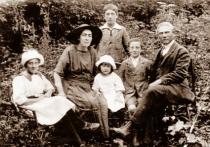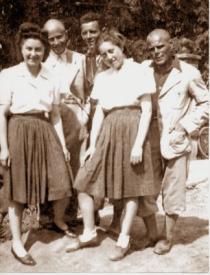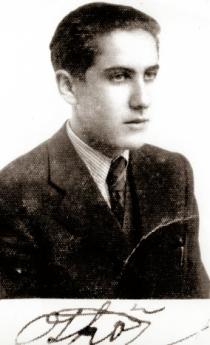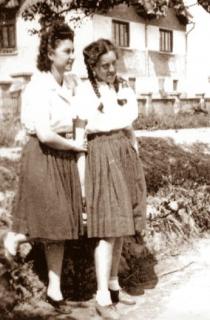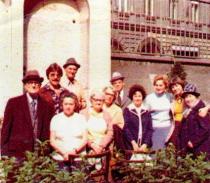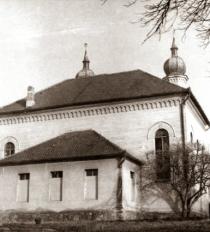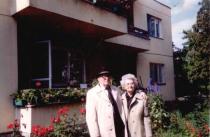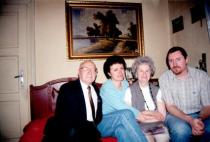This is a photo with me - I am the first from left - and my younger sister, Edit Lowi. It was taken in Covasna in 1944, three or four weeks before we were deported, in front of the house we lived in at the time. We weren’t wearing any uniforms, those were our summer clothes, I remember mine were red and white, I used to ride the bike in those clothes. My sister wore her hair - she had beatiful thick hair- in plaits, I still remember that they cut them when we got to Auschwitz. By that time I already did my hair in some other way that was in fashion.
The first time I came across anti-Semitism was when I wasn't allowed to go to school. When I was 17 years old, in 1937, numerus clausus was enforced. I would have liked to go, but I saw it was impossible. So I went home and in 1940 I got a job there, in Covasna. I started working something at the forest ward, but I had only worked for two months I think, when the Vienna dictate came and northern Transylvania was given to the Hungarians and those offices were closed down. My parents also felt anti-Semitism, in 1940. People were laid off at the factory where my father worked. The Hungarian authorities forced it, they were Hitler's allies and they pushed for these dismissals; and my father was laid off from the factory where he had a good job and a nice salary; I got fired too, my brothers as well, and Emil and Francisc were drafted in the army.
From 1940 to 1944, when we were taken away, we did something, which was my initiative: the idea would have been good, but we didn't succeed. I made up this plan in 1942, to go and hide, to move to Budapest, we had all our relatives there, there were my father's siblings, my mother's siblings, and we wouldn't have been so alone. I thought we might hide better there, we wouldn't have been so conspicuous. We stayed in Budapest for half a year, we stayed until fall, but we couldn't get an approval to stay in the city of Budapest, and without that one wasn't allowed to stay there. I don't know how the police tracked us down that we were Jews and that we stayed in Budapest without the necessary approvals. The problem wasn't that we came from another country, but from another city. At first we were taken to jail. We stayed there for about three weeks, not in the actual jail, but we were forced to stay where all those without their papers in order had to crowd in. It was a separate room for the Jewish prisoners and another for those who were thieves or who know what else. But fortunately uncle Ignac had an acquaintance, a good friend of a counselor who was an important person there, at the Ministry of Justice, and that person could solve what was almost impossible, he arranged that we wouldn't be sent to Auschwitz after three weeks. The rest of the people there, the other Jews who were found without approval to stay in Budapest were sent immediately, in 1942, to Auschwitz. So we were sent back to Covasna.
From 1942 to 1944 we stayed in Covasna. It was a so-called house arrest, that's what we had, forced residence, until the police deported us. It as the same house where we had stayed before. We couldn't go anywhere: we could go out of the house, but not out of the town. That’s where we were deportd from on May 4th, 1944.

